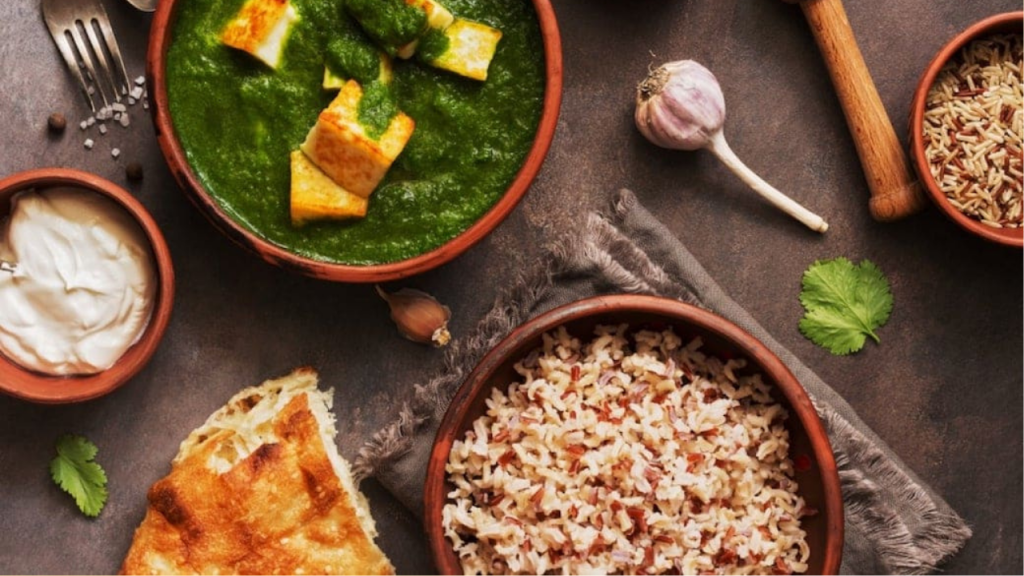Living with diabetes doesn’t mean you have to give up on flavorful food—especially when it comes to Indian cuisine. With a rich variety of whole grains, legumes, vegetables, and spices, Indian food offers many healthy choices for diabetics. The key is knowing which dishes support blood sugar balance and which ones to limit or avoid.
This blog offers practical tips and Indian dietary choices ideal for those managing diabetes, without compromising on taste or tradition.
In this Article
Understanding Diabetes and Diet
Diabetes is a chronic condition that affects how your body processes blood sugar (glucose). Managing your blood sugar levels through a healthy diet plays a major role in preventing complications and maintaining overall health.
Must Read: Millets vs. Quinoa: A Detailed Comparison of Two Superfoods
Key dietary principles for diabetics include:
- Focusing on low-glycemic index (GI) foods
- Choosing high-fiber, complex carbohydrates
- Avoiding refined sugars and flours
- Eating small, balanced meals throughout the day
Let’s explore how you can follow these principles using everyday Indian ingredients and meals.
What Indian Foods Are Good for Diabetics?
Indian cuisine, when prepared mindfully, offers many dishes that are naturally diabetic-friendly. Here are some wholesome choices:
Whole Grains Instead of Refined Flour
What to eat:
- Brown rice
- Quinoa
- Whole wheat roti (without ghee)
- Bajra (pearl millet)
- Jowar (sorghum)
- Dalia (broken wheat)
Why it’s good:
Whole grains are high in fiber, help slow glucose absorption, and keep you full longer.
Lentils and Legumes
What to eat:
- Moong dal
- Toor dal
- Rajma (kidney beans)
- Chana (chickpeas or Bengal gram)
- Masoor dal
Why it’s good:
Lentils are rich in protein and fiber, and they help regulate blood sugar while supporting muscle health.
Low-Glycemic Vegetables
What to eat:
- Bitter gourd (karela)
- Bottle gourd (lauki)
- Spinach and other leafy greens
- Cauliflower
- Green beans
- Pumpkin (in moderation)
Why it’s good:
These vegetables are low in carbohydrates and high in nutrients, helping control sugar levels without spiking insulin.
Healthy Indian Breakfast Ideas for Diabetics
- Vegetable upma with oats or broken wheat
- Moong dal chilla (savory pancakes) with mint chutney
- Poha made with brown rice flakes and added vegetables
- Besan (chickpea flour) cheela with grated bottle gourd
Balanced Indian Lunch and Dinner Ideas
- 1-2 phulkas (roti) made with whole wheat or jowar + a bowl of dal + cooked green vegetable + salad
- Quinoa pulao with mixed vegetables and tofu/paneer
- Brown rice with rajma or chana and a side of cucumber raita
- Bajra or ragi roti with methi (fenugreek) sabzi and curd
What to Avoid in a Diabetic Indian Diet
High Glycemic Index Foods
Avoid foods that lead to quick spikes in blood sugar.
What to avoid:
- White rice
- Maida-based bread (like naan or puris)
- Potatoes in large quantities
- Deep-fried snacks like samosas and pakoras
- Sweets like gulab jamun, rasgulla, and jalebi
Sugary and Processed Items
What to avoid:
- Sweetened beverages like chai with sugar, packaged juices
- Mithai and desserts made with condensed milk or refined sugar
- Store-bought snacks with high sodium and sugar content
Mind Your Portion Sizes
Even healthy foods can affect blood sugar if consumed in excess. It’s important to eat in moderation and space out your meals across the day.
Smart Indian Snacking Tips for Diabetics
If you like to snack between meals, here are some better options:
- Roasted chana
- A handful of unsalted almonds or walnuts
- Sprouted moong salad
- Cucumber or carrot sticks with hummus
- Buttermilk or a small bowl of curd with flax seeds
Spices That Help with Blood Sugar Control
Indian spices are more than just flavor boosters. Some offer real health benefits for diabetics:
- Fenugreek (methi): Helps improve insulin sensitivity
- Turmeric (haldi): Reduces inflammation and supports blood sugar control
- Cinnamon (dalchini): May help lower fasting blood glucose
- Cumin (jeera): Supports digestion and glucose metabolism
You can include these spices in your dals, curries, and even teas to enhance both taste and health.
Lifestyle Tips to Complement a Diabetic Diet
- Stay active: Light walking after meals helps regulate blood sugar.
- Hydrate regularly: Drink plenty of water to flush out excess glucose.
- Practice mindful eating: Eat slowly, avoid screens while eating, and pay attention to hunger cues.
- Monitor blood sugar levels: Keep a regular check to understand what foods work best for you.
Frequently Asked Questions (FAQs)
Can diabetics eat rice?
Yes, but opt for brown rice or small portions of basmati rice, which have a lower glycemic index than white rice. Pair rice with lentils and vegetables to reduce the glycemic load.
Is Indian roti good for diabetics?
Whole wheat roti is a good choice. For even better results, try jowar, bajra, or ragi rotis, which are high in fiber and low in GI.
Are Indian sweets completely off-limits?
Traditional sweets made with sugar and condensed milk should be limited. However, occasional homemade sweets made with natural sweeteners like stevia, dates, or jaggery (in moderation) may be consumed based on medical advice.
What is a good Indian breakfast for diabetics?
Vegetable oats upma, moong dal chilla, poha with added vegetables, and besan pancakes are good options.
Can I eat fruits if I have diabetes?
Yes, choose fruits with a lower glycemic index such as guava, apple, pear, papaya, and berries. Eat them in moderation and preferably not on an empty stomach.
For more wholesome and healthy Indian food inspiration, check out our curated collection of healthy Indian recipes on Indian.Community.

